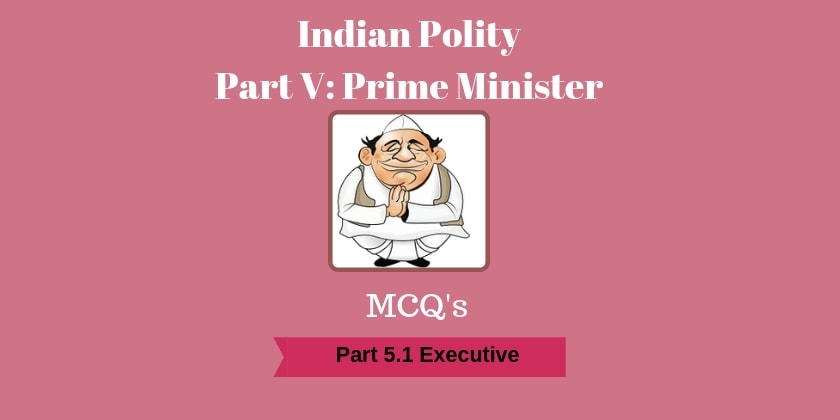Indian Polity Part V: Prime Minister of India-MCQ’s
Part V of the Constitution (The Union) Chapter I (Executive) deal with President, Vice President, Council of Ministers (CO) and the chairmanship of the Attorney General.
We Have already discussed the President and the Vice President, let’s now concentrate on COM, Prime Minister.
Article 75 of the Indian Constitution envisages that there will be a Prime Minister of India who shall be appointed by the President. Prime Minister is the leader of the Cabinet Ministers. The main executive powers of the government are vested in the Prime Minister while the President is the nominal head of the State. Therefore, The President is the head of the State whereas the Prime Minister is the head of the Government.
Powers of the Prime Minister:
- Prime Minister proposes the names of the members of his political party to President for appointment as Ministers.
- He decides the distribution of charge to various ministers and can reshuffle their cabinet.
- He presides over the meetings of Cabinet and can change the decisions taken therein.
- He suggests the President of India about the resignation or removal of any Minister from his Cabinet.
- He controls and directs the functioning of Ministers in the Cabinet.
- He can resign anytime and can suggest the President of India dissolve the Cabinet. He can suggest the President dissolve Lok Sabha and to organize fresh elections.
- If the Prime Minister resigns from his post or dies in office, The Cabinet stops functioning and spontaneously dissolves after the death of the Prime Minister.
Appointments and suggest the President by the Prime Minister:
1. Comptroller and Auditor General of India
2. Attorney General of India
3. Advocate General of India
4. Chairman and members of UPSC
5. Selection of Election Commissioners
6. Members and chairman of Finance Commission
Article 74: To advice the President in various matters
Article 75: The Prime Minister will be appointed by the President of India
Duties of the Prime Minister:
1. To report all the works done by the Cabinet Ministers to the President of India.
2. To brief the President of India about any state of Emergency or any matter of foreign policy or urgent importance.
3. To inform the functioning of the Government and Union of India to the President.’
Part V: Prime Minister of India-MCQ’s
1. Who is the chairman of the Lok Sabha?
A. President
B. Minister of Parliament affairs
C. Speaker
D. Prime Minister
[toggle] Answer – C [/toggle]
2. Which one of the following Articles empowers the President to Appoint Prime Minister of India?
A. Article 74
B. Article 75
C. Article 76
D. Article 77
[toggle] Answer – B [/toggle]
3. The President of India can declare an emergency?
A. on the recommendations of the Prime Minister
B. on the recommendations of the Parliament
C. on the recommendations of the Council of Ministers
D. on his own
[toggle] Answer – A [/toggle]
4. The Prime Minister of India is:
A. Selected
B. Nominated
C. Appointed
D. Elected
[toggle] Answer – C [/toggle]
5. The Prime Minister is appointed by which one of the following?
A. Attorney general of India
B. President
C. Vice-president
D. Chief justice of India
[toggle] Answer – B
Explanation: The Prime Minister shall be appointed by the President and the other Ministers shall be appointed by the President on the advice of the Prime Minister.under Article 75(1), Constitution of India[/toggle]
6. Who among the following shall communicate to the president all the decisions of the council of ministers under article 78?
A. Home minister
B. Prime minister
C. Attorney general
D. Finance minister
[toggle] Answer – B [/toggle]
7. The total number of ministers including the prime ministers shall not exceed-
A. 20% members of the Lok Sabha
B. 10% members of the Lok Sabha
C. 25% members of the Lok Sabha
D. 15% members of the Lok Sabha
[toggle] Answer – D
Explanation: in the Article 75 of the Indian constitution which made a specific provision that, the total number of Ministers, including Prime Minister, in no case, can exceed 15 percent of the total number of Lok Sabha members.[/toggle]
8. Who among the following appoints the Chief Justice and other Judges of the Supreme Court?
A. Prime minister
B. Vice-president
C. Home minister
D. President
[toggle] Answer – D [/toggle]
9. The total number of Ministers including the Prime Minister shall not exceed
A. 20% of the members of Lok Sabha
B. 25% of the members of Lok Sabha
C. 15% of the members of Lok Sabha
D. 10% of the members of Lok Sabha
[toggle] Answer – C [/toggle]
10. Who is the chairmen of National Integration Council?
A. President of India
B. Prime Minister of India
C. Minister of Minority affair
D. Chief Justice of India
[toggle] Answer – B
Explanation: The National Integration Council (NIC) is a group of senior politicians and public figures in India that looks for ways to address the problems of communalism, casteism, and regionalism.[/toggle]

